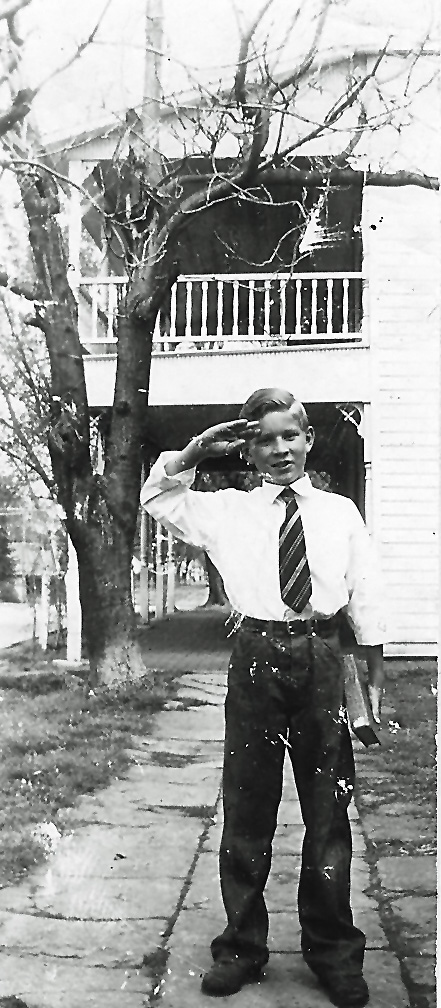
The War was Everywhere Affecting Everything
Don Carriker - 1944 12 years old
At first "The War" seemed to be a fine thing. There was an excitement and sense of purpose in the air. Even a kid could feel prosperity blooming. We moved from our primitive bungalow, with its outhouse in the back yard into another rental house. This one had indoor plumbing and was closer to town. After living there a few months Dad bought the house on Taylor Street that became my childhood home. It was the first house Dad ever owned. The developing prosperity also enabled him to trade his `35 Dodge for an almost new, 1941 two-door, Ford V-8.
Excitement and fear were in the air but we kids felt mostly the excitement and it was exhilarating. The electricity that crackles through the air when every citizen in the country is focused on and totally dedicated to one cause is indescribable. It faded after the war ended and has never returned. Everything we did related to winning "The War." If it was not part of “the war effort”, it was not worth doing. As kids, “war" was just a big fight that we would inevitably win. We had seen plenty of movies featuring cowboys, Indians, crooks, and cops. We learned from them that “the good guys" always win and there was no doubt in our minds but that Americans were the “good guys” in this war.
Dad came home one day telling Mother and I that a "big shot" had visited the machine shop where he worked. “He said we wouldn’t be drafted because we were vital to the war effort. He said we're the man behind the man behind the gun" Dad crowed. I pictured Dad crouching bravely behind a man with a gun handing him ammunition and reloading for him and I was proud.
My older sister, Frances, who graduated in the Class of 1942, expanded my feelings of pride. Toward the end of the school year, she came home happily singing her class’s graduation song, which, to the tune of “The Daring Young Man on the Flying Trapeze" went:
"We are the Seniors of `42
Weighted down with high IQ.
As soldiers and sailors, we will excel.
We'll go to the Army, or sleep in a cell."
My friends and I lost interest in “Cowboys and Indians". We became soldiers and played “war”. Since the land war in the early days was all in the Pacific our enemies were “the Japs”. We had to fight imaginary Japanese soldiers when we played war because nobody wanted to be one of “them”. We slaughtered little people who, according to the catechism we learned at the movies, were all bandy-legged, near-sighted, and buck-toothed. We annihilated legions of them with hand grenades we “armed” by pulling the pin with our teeth, and we annihilated them with machine guns to the accompaniment of our vocalized “ta-ta-ta-ta-tat” rapid fire. Our teachers tried to keep things normal at school but it was impossible. War was everywhere.
The Gregg Theater showed a steady diet of war movies. “Our boys”, played by John Wayne, Robert Montgomery, and other Hollywood stars, fought bravely, suffered, and died, but always, in the end, they bought victory. The Caney Daily Chronicle carried news about our hometown boys in the service while the Tulsa Tribune and Tulsa World brought headlines and stories about battles, defeats, victories, strategy, and patriotism. They were censored, of course, as were the letters “our boys” wrote home. When the guys were careless, their letters were almost incoherent because so many words had been snipped or blacked-out by the censor. Their return addresses were “Somewhere in England”, “At Sea”, or “In the Pacific.” Secrecy was king. Posters showing a burning, sinking ship with soldiers and sailors struggling and sinking in the water loomed at us from the walls of the Post Office. A grim legend below the picture read “Loose Lips Sink Ships”.
During free time at school, or when "Teacher" wasn't looking, I and other boys sketched battle scenes in our notebooks or tablets. They were panoramas of frightful carnage, with airplanes strafing, cannons firing, machine guns rattling, and enemy airplanes going down in flames. We drew hapless American pilots coming down in parachutes being machine-gunned by barbaric enemy pilots. At recess, we played at being paratroopers by “pumping” our swings as high as we could get them to go and then “bailing out”.
Our teacher stopped that when one of my friends, with the unlikely but actual name of "Tommy Hawk," pulled up lame after leaping eight to ten feet out of the swing onto the hard ground.